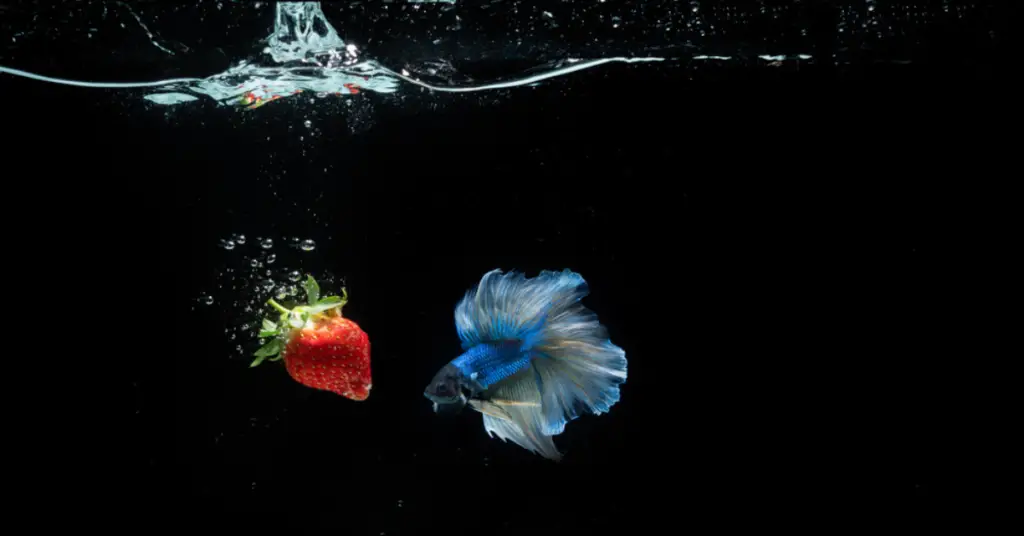Fishkeeping is a fascinating hobby, and when it comes to taking care of our finned friends, it’s crucial to know about their dietary requirements. Betta fish, also known as Siamese fighting fish, are a popular choice among aquarists.
While it may seem like an interesting idea to feed your betta strawberries, it’s essential to understand whether this is a suitable option. In this article, we’ll delve into the dietary needs of betta fish and explore if strawberries are a viable food choice.
Understanding Betta Fish Diet
Natural Diet of Betta Fish
Betta fish are primarily carnivorous in nature, which means that their diet primarily consists of protein-rich foods. In the wild, bettas feed on insects, insect larvae, and small crustaceans such as daphnia and brine shrimp.
Commercial Betta Fish Food
Commercial betta fish food is formulated to meet the specific dietary needs of these fish. High-quality betta pellets and flakes are designed to provide the right balance of protein, vitamins, and minerals that bettas require for optimal health.
In addition to pellets and flakes, frozen and live foods can also be offered as treats to supplement their diet.
Can Betta Fish Eat Strawberries?
While it might be tempting to offer your betta fish a small piece of strawberry, it’s important to understand that this fruit is not a natural part of their diet.
Betta fish lack the enzymes needed to break down and digest plant matter, especially fruits. Feeding your betta strawberries can cause indigestion, bloating, and other health issues.

Risks of Feeding Betta Fish Strawberries
Digestive Issues
As mentioned earlier, betta fish do not have the necessary enzymes to digest fruits like strawberries.
Consumption of such foods can lead to constipation and other digestive issues, causing discomfort and negatively impacting the health of your fish.
Nutritional Imbalance
Feeding your betta fish strawberries can also lead to an imbalance in their diet. Since bettas are carnivorous, they need a protein-rich diet to thrive.
Consuming strawberries can interfere with their nutrient intake and cause deficiencies in essential vitamins and minerals.
Water Quality
When uneaten strawberry bits are left in the aquarium, they can break down and pollute the water.
This can lead to a decline in water quality, which is detrimental to the overall health of your betta fish and other aquatic life in the tank.
Alternatives to Strawberries for Betta Fish
Live and Frozen Foods
Offering live or frozen foods such as brine shrimp, daphnia, bloodworms, and mosquito larvae can be an excellent way to provide variety in your betta’s diet.
These protein-rich foods will help to keep your fish healthy and satisfied.
Vegetables
Although bettas are carnivorous, some vegetables can be offered occasionally as a treat.
Small pieces of blanched spinach or peas can be provided to bettas to promote digestion and prevent constipation. Remember to remove any uneaten vegetables from the tank to maintain water quality.
FAQs
What do betta fish eat in their natural habitat?
In the wild, betta fish primarily feed on insects, insect larvae, and small crustaceans such as daphnia and brine shrimp.
Can betta fish eat fruit?
Betta fish lack the necessary enzymes to digest fruits, and feeding them fruit can lead to digestive issues and nutritional imbalances.
How often should I feed my betta fish?
Adult betta fish should be fed once or twice daily, with the amount they can consume in about 2-3 minutes.
Be cautious not to overfeed, as overfeeding can lead to obesity, constipation, and other health problems.
Conclusion
In conclusion, betta fish should not be fed strawberries as they lack the enzymes needed to digest fruits properly.
Feeding them fruit can lead to digestive issues, and nutritional imbalances, and pollute the water quality in their tank.
Offering bettas high-quality commercial food, live or frozen foods, and occasional blanched vegetables can provide them with the necessary nutrients for optimal health.
It’s crucial to understand the dietary needs of your betta fish to ensure their well-being and longevity in your care.